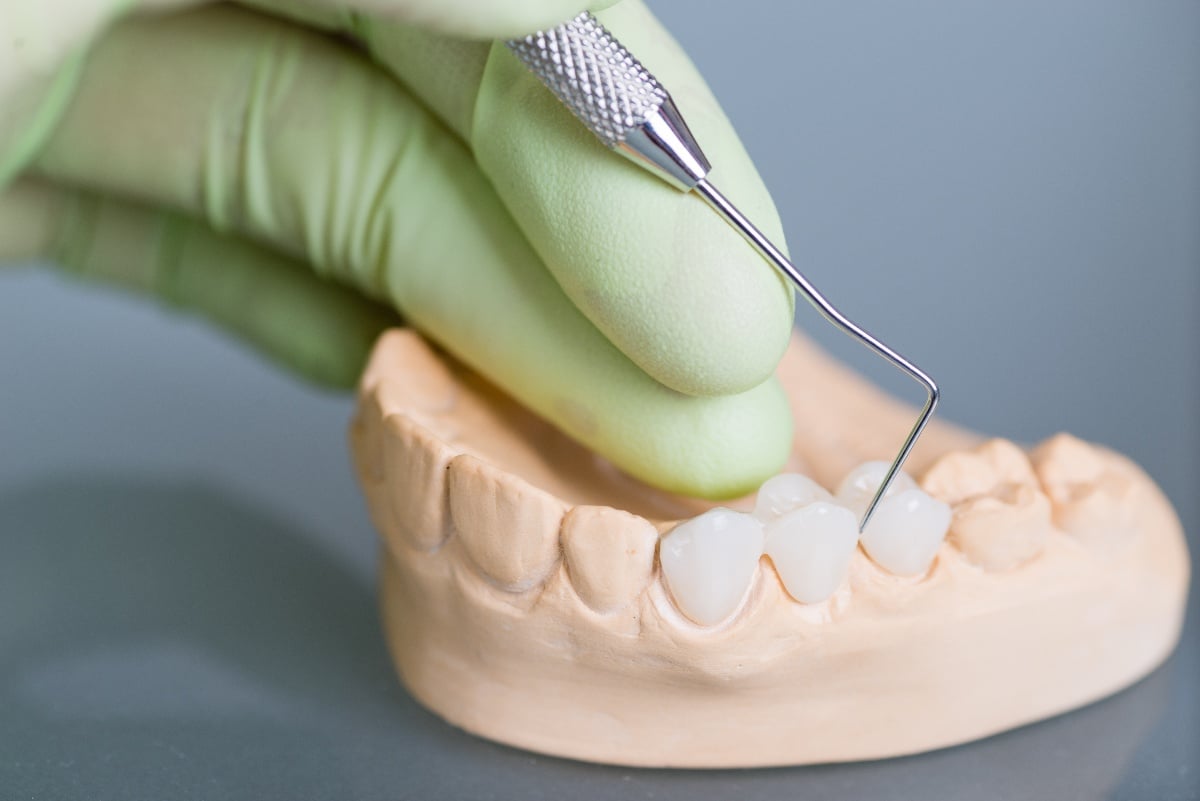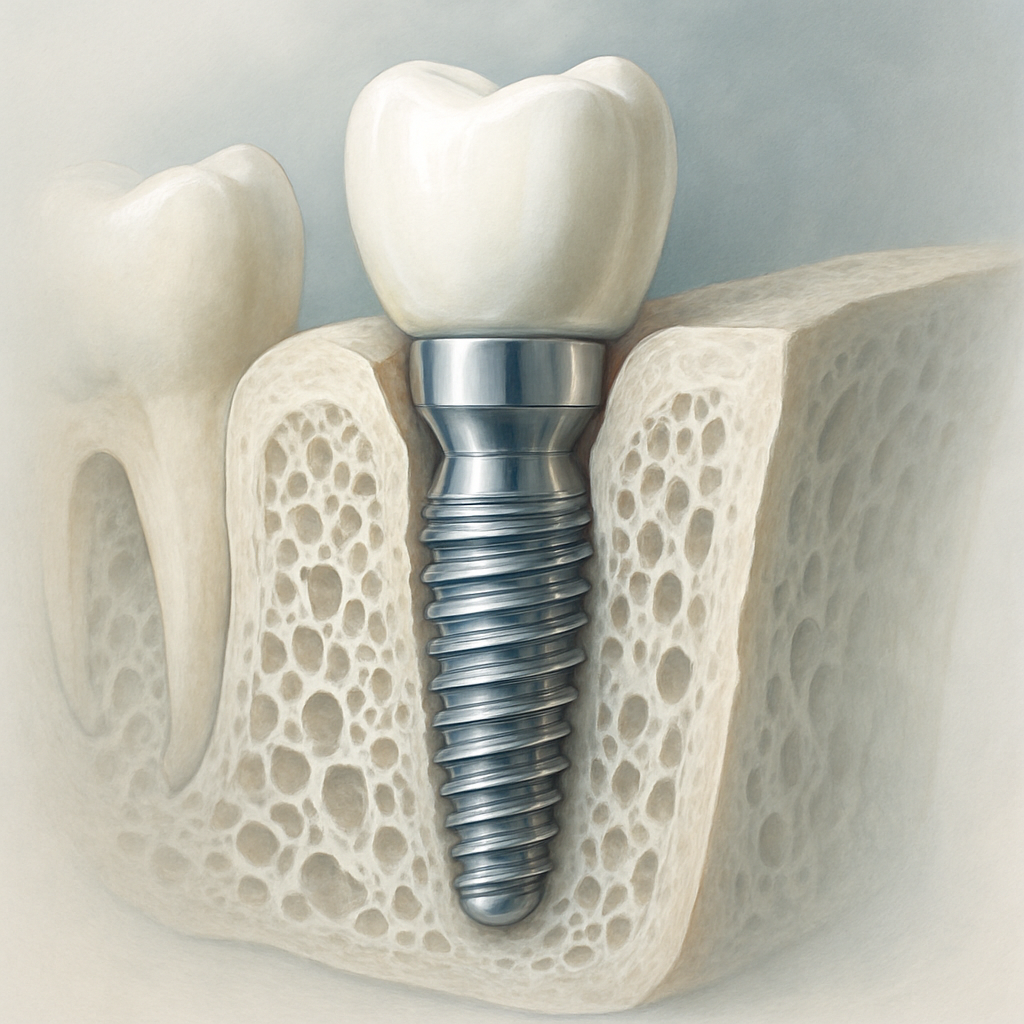A bright and confident smile can positively affect your self-esteem and overall well-being, in addition to your oral health. Achieving that perfect smile often requires a delicate balance of aesthetics and functionality. Dental health is more than just preventing cavities and gum disease. It’s also about ensuring that your teeth look and feel their best. Two common cosmetic dental procedures are porcelain crowns and veneers. For many, these play an essential role in enhancing dental aesthetics while addressing functional concerns and problems.
Ten Reasons You Might Need a Dental Crown
Dental crowns are restorative dental restorations that serve as protective coverings for encasing a damaged or weakened tooth. They are essential in various situations to restore both the function and appearance of teeth. Here are ten common reasons you may need a dental crown:
1. Extensive Tooth Decay. A crown is often recommended when a tooth is affected by severe decay that cannot be adequately repaired with a dental filling. The crown covers the damaged portion, preventing further decay and restoring the tooth's strength.
2. Fractured or Broken Teeth. Fractured, severely chipped, or worn teeth may require crowns to restore their function and appearance and prevent further damage.
3. Root Canal Treatment. After a root canal procedure, the affected tooth may be susceptible to future fracturing. A crown is permanently bonded to strengthen and prevent the tooth from future damage.
4. Cosmetic Enhancement. Crowns are the most common procedure performed in cosmetic dentistry to improve and enhance a smile. They can address issues like severe tooth discoloration, misshapen teeth, or excessive gaps between teeth, providing a more aesthetically pleasing smile.
5. Large Fillings. When a tooth has a large filling that compromises its structural integrity, a crown may be recommended to prevent it from fracturing. Crowns help distribute biting forces evenly while chewing.
6. Restoring a Dental Implant. Crowns are the visible part of restoring dental implants. They are secured to the implant's abutment, providing a natural-looking tooth replacement.
7. Strengthening Weakened Teeth. Teeth weakened by excessive wear, age, or grinding may benefit from crowns. Crowns add strength and durability, enabling the tooth to function optimally.
8. Correcting Misaligned Teeth. Dental crowns can be used to alter the shape and alignment of teeth, improving their overall appearance and alignment.
9. Enhancing the Appearance of Premolars and Molars. Crowns are commonly used for premolars and molars, especially when these teeth are highly visible when smiling. They offer both functional support and cosmetic benefits.
10. Preventing Tooth Cracks. Teeth with deep cracks or those at risk of cracking can be protected with crowns. Crowns hold the tooth together and prevent further damage.
What Are Dental Crowns Made Of?
Dental crowns, vital for restoring some damaged teeth, can be made from various materials. Each of these dental materials has unique properties suited to specific dental needs. The choice of crown material depends on factors such as the tooth's location, the extent of damage, and your preferences. Here are the materials commonly used for dental crowns:
Porcelain (Ceramic) Crowns
- Natural aesthetics–Closely resemble natural teeth thanks to their translucent and color-matching properties.
- Biocompatible–Well-tolerated by the body, minimizing the risk of allergies or sensitivities.
- Stain Resistance–Highly resistant to staining and discoloration, ensuring a lasting, bright smile.
- Gum Tolerance–Gentle on gums and tissues, reducing the likelihood of irritation.
- Durability–Offers excellent durability for everyday use with proper care.
Metal Crowns (Gold or Silver Alloy)
- Strength and durability–Renowned for their longevity and ability to withstand strong biting forces.
- Minimal tooth reduction–Requires less tooth removal than some other materials.
- Biocompatibility–Well-tolerated by the body, making them a suitable choice for certain situations.
Porcelain-Fused-to-Metal (PFM) Crowns
- Aesthetic appeal–Combines the natural appearance of porcelain with the strength of metal, making them a versatile choice.
- Durability–Offers durability while providing an aesthetically pleasing result.
- Tooth reduction–Requires slightly more tooth reduction than all-porcelain crowns.
Zirconia Crowns
- Strength and Durability–Known for their robustness, zirconia crowns are ideal for posterior teeth.
- Aesthetic Options–Offer good aesthetic results, especially when strength is essential.
Advantages of Zirconia Crowns
Zirconia crowns are custom-made from zirconium oxide, a white, crystalline material known for its strength and biocompatibility. Zirconium oxide has been used in various medical applications for years, including artificial joints, thanks to its excellent resistance to wear and corrosion. In dentistry, zirconia is used to create crowns that can withstand the forces of biting and chewing while providing a natural appearance.
Zirconia crowns offer many advantages, such as:
- Strength and durability. Zirconia is a ceramic material that creates dental restorations with exceptional strength and longevity. This property makes zirconia crowns incredibly robust, allowing them to withstand the forces of biting and chewing, even in the posterior teeth, which endure the most pressure during chewing.
- Biocompatibility. Zirconia is biocompatible, which is well-tolerated by the body and rarely leads to allergic reactions or sensitivities. This makes zirconia crowns suitable for a wide range of patients, including those with sensitivities to other materials.
- Aesthetic appeal. Despite its strength, zirconia possesses superior translucency and color-matching capabilities that closely resemble natural teeth. This aesthetic advantage is particularly important for individuals seeking both durability and beauty in their dental restorations.
- Minimal tooth reduction. Zirconia crowns require minimal tooth reduction during the preparation process. This conservative approach preserves more of the natural tooth structure, promoting long-term oral health and reducing the risk of sensitivity.
- Longevity. Zirconia crowns are renowned for their durability and long lifespan. With proper care and maintenance, they can serve their purpose for many years, offering a cost-effective solution in the long run.
- Versatility. Zirconia crowns are versatile and can be used for various dental applications, including crowning individual teeth, dental bridges, and dental implant restorations. Their adaptability makes them a suitable option for numerous restorative needs.
- Reduced Sensitivity. Due to its biocompatibility and minimal tooth reduction, zirconia crowns are less likely to cause post-treatment sensitivity or discomfort, enhancing your comfort during and after the procedure.
Six Reasons You Might Need Dental Veneers
Dental veneers are thin, custom-made shells that are bonded to the front surface of teeth. Dental veneers are primarily used for cosmetic purposes to enhance the appearance of your smile and can address a wide range of aesthetic concerns. Here are six reasons you might need dental veneers:
- Tooth Discoloration: Veneers can cover severe stains or discoloration that may not respond well to teeth whitening treatments.
- Chipped or Cracked Teeth: Veneers can restore minor chips and cracks for a brighter and healthier smile.
- Irregularly Shaped Teeth: Veneers can improve the alignment and shape of your teeth, providing a more uniform and attractive smile.
- Unwanted Gaps: Veneers can close small gaps between teeth, sometimes eliminating the need for orthodontic treatment.
- Worn Down Teeth: Veneers can restore the length and shape of worn-down teeth, rejuvenating your smile.
- Minor Orthodontic Issues: In certain situations, veneers can be used as a cosmetic alternative to correct minor orthodontic issues, such as slightly crooked teeth.
Choosing Between Veneers and Zirconia Crowns
When faced with restoring damaged teeth or simply wanting to improve your smile, weighing the pros and cons of your options in the context of your unique dental needs and cosmetic goals is important. Veneers enhance the appearance of your teeth, making them an excellent choice for addressing issues like discoloration, minor misalignment, or irregularly shaped teeth.
On the other hand, zirconia crowns offer a combination of strength, durability, and aesthetics, making them the preferred option for situations requiring structural support and improved aesthetics. Ultimately, consulting with your dentist will help you make the best choice to achieve your desired smile makeover.
Schedule an Appointment
To learn more about the various cosmetic and restorative options provided by Palmetto Dental Arts, call us or contact us online.







